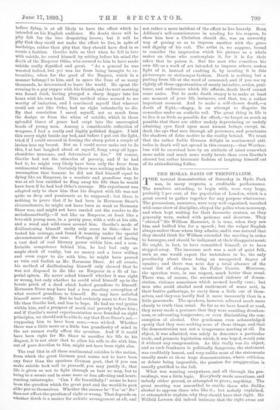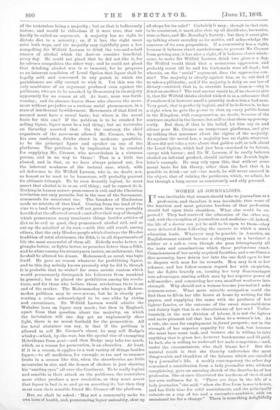THE MORAL BASIS OF TEETOTALISM.
THE teetotal demonstration of Saturday in Hyde Park was, in many respects, a creditable performance. The numbers attending, to begin with, were very large, probably 2 per cent. of the population of London, which is a great crowd to gather together for any purpose whatsoever. The processions, moreover, were very well organised, marched with some show of discipline, obeyed the police when necessary, and when kept waiting for their favourite orators, as they generally were, waited with patience and decorum. They " chivied " Sir William Harcourt, it is true, when they saw him, and bullied him for a speech ; but the vulgar English. always molest those whom they admire, and it was natural that they should think Sir William attended the meeting in order to harangue, and should be indignant at their disappointment.4 He ought, in fact, to have committed himself, or to have stopped away. The immense mob was a mob of quiet folk, such as one would expect the teetotalers to be, the only peculiarity about them being an unexpected degree of squalor ; and there was next day a total absence of the usual list of charges in the Police Courts. Moreover, the speeches were, in one respect, much better than usual. There was, of course, the accustomed violence of denun- ciation, violence sometimes which seemed hardly sane; but men who avoid alcohol need excitement of some sort, in their festive gatherings, to carry them a little out of them- selves, and they can hardly find it more innocently than in a little gasconade. The speakers, however, adhered much more closely to truth than usual. So far as we have heard or read, they never made a pretence that they were assailing drunken-. ness, or advocating temperance, or even diminishing the con- sumption of alcohol. One gentleman even acknowledged openly that they were seeking none of these things, and that the demonstration was not a temperance meeting at all. Its object, it was admitted, was solely to denounce a particular trade, and promote legislation which, it was hoped, would ruin it without any compensation. As this really was its object, and as such frankness is politically dangerous, the statement was creditably honest, and very unlike moat of the statements usually made at these huge demonstrations, where criticism or debate being impossible, the passion for exaggeration is usually gratified to the full.
What was wanting everywhere, and all through the pro- ceedings, was a little logic. Everybody made assertions, and nobody either proved, or attempted to prove, anything. The great meeting was assembled to enable those who dislike alcohol to oppress those who like it ; but nobody explained, or attempted to explain, why they should have that right. Sir Wilfrid Lawson did indeed intimate that the right arose out
of the teetotalers being a majority ; but as that is ludicrously untrue, and would be ridiculous if it were true, that can hardly be called an argument. A majority has no right to dictate diet to a minority ; or, if it has, the right must exist both ways, and the majority may rightfully pass a law compelling Sir Wilfrid Lawson to drink the two•and-a-half ounces of alcohol which the doctors consider beneficial. every day. He could not plead that he did not like it, for he advises compulsion the other way ; and he could not plead that drinking alcohol was in se immoral, for he proposes as an inherent condition of Local Option that liquor shall be legally sold and consumed in any parish in which the parishioners are silly enough to wish it. Yet this was the only semblance of an argument produced even against the publicans, who are to be smashed by Democracy in its majesty apparently for no reason at all. At least, none was forth- coming ; and its absence leaves those who observe the move- ment without prejudice as a curious social phenomenon, in a state of intellectual bewilderment. Movements of that kind to succeed must have a moral basis ; but where is the moral basis for this one ? If the publican is to be crushed for selling liquor, liquor must be a bad thing; but no teetotaler on Saturday asserted that. On the contrary, the chief organisers of the movement allowed Mr. Cremer, who, by his own confession, drinks claret in moderate quantities. to be the principal figure and speaker on one of the platforms. The publican is by implication to be crushed for supplying Mr. Cremer, who nevertheless is a virtuous person, and in no way to blame ! That is a little too absurd, and in that, as we have always pointed out, lies the inherent weakness of the teetotal case, which, with all deference to Sir Wilfrid Lawson, who is, we doubt not, as honest as he used to be humorous, will probably prevent its ultimate triumph. To be even decently logical, he must assert that alcohol is in as an evil thing ; and he cannot do it. Nothing in human nature pronounces it evil, and the Christian revelation not only permits, but in the case of the Sacrament. commands its occasional use. The founders of Hindooism made no mistake of that kind. Coming from the land of the vine to a land where grapes will not grow. they were probably horrified at the effects of arraek ; and after their way of thought, which pronounces many inanimate things besides articles of diet to be evil or good, they pronounced alcohol evil, and so cat-up the mischief at its root.—with this odd result, among others, that the only Hindoo people which disobeys the Hindoo tradition of total abstinence, the Sikh, is in all departments of life the most successful of them all. Nobody works better, or ploughs better, or fights better, or preaches better than a Sikh, and be alone among his countrymen insists, on enlistment, that he shall be allowed his drams. Mahommed, as usual, was logic itself. He gave no reason whatever for prohibiting liquor, and to this day nobody knows precisely why be did it, though it is probable tbat be wished for some ascetic custom which would permanently distinguish his followers from mankind in general; but he placed the prohibition among his revela- tions, and for those who believe those revelations there is an end of the matter. The lYlahommeda.n who hangs a Mahon*. medan publican may be over-severe, but he is clearly pre- venting a crime acknowledged to be one alike by victim and executioner. Sir Wilfrid Lawson would admire the Wahabee laws on liquor very much ; but then in England, apart from that question about the majority, on which the teetotalers will one day get an unpleasantly clear light, there is no moral foothold for the persecution. All the total abstainer can say, is that if the publican is allowed to sell Mr. Cremer's claret, he may sell Hodge's whisky—which, by-the-way, has the special vice of exempting Hebrideans from gout—and then Hodge may take too much, which. as a reason for persecution, is an absurdity. At least, if it is a reason, it applies to a vast variety of things besides liquor,—to all medicines, for example, to tea. and to summer fruits in a season like this, when the strawberries are little mountains in size, and the demon of cholera is just showing his "smiting eyes" all over the Continent. To be really logical and sensible in their attack on the publicans, the teetotalers must either produce a new revelation, or they must assert that liquor is bad in se. and go on asserting it ; but then they must turn their sensible friend Mr. Cremer off the platform.
But, we shall be asked: May not a community make its own laws of health, and, pronouncing liquor unhealthy, shut up
all shops for its sale? ' Certainly it may ; though in that case, to be consistent, it must also shut up all distilleries, breweries, wine-cellars, and Mr. Beaufoy's factory ; but then it must give up talking about morality as its motive, and acknowledge the converse of its own proposition. If a community has a right, because it believes claret unwholesome, to prevent Mr. Cremer from getting any, it has also a right, if it believes claret whole- some, to make Sir Wilfrid Lawson drink two glasses a day. Sir Wilfrid would think that a monstrous oppression, and probably resist till he and his foxhounds were all dead ; but wherein, on the "social" argument, does the oppression con- sist P The majority is clearly against him, as be will find if he takes a plebiscite; and if the majority is deity on one law of dietary—entitled, that is, to override human reason—why is it not on another ? The real answer would be, if he chose to give it, that Sir Wilfrid thinks alcohol wicked in es, a substance that if swallowed in however small a quantity makes him a bad man. Very good; that is perfectly logical, and if he believes it, he has a right when he gets the power to shut up every public-house in the Kingdom, with compensation, no doubt, because of the contract implied in the licence, but still to shut them up peremp- torily. But then, if that is his belief, let him say so, and silence poor Mr. Cremer on temperance platforms, and give up talking that nonsense about the rights of the majority. As against the moral law, a majority has no rights whatever. Moses did not take a vote about that golden calf, or talk about the Local Option, which bad just been exercised in its favour, except with horror; and Sir W. Lawson, if he really believes alcohol an infernal product, should imitate the Jewish legis- lator's example. He may rely upon this, that without some moral basis for his theory, other than the fact that it is possible to drink—or eat—too much, he will never succeed in the object, that of ruining the publicans, which, we admit, he has through a long career so consistently and ably pursued.



































 Previous page
Previous page